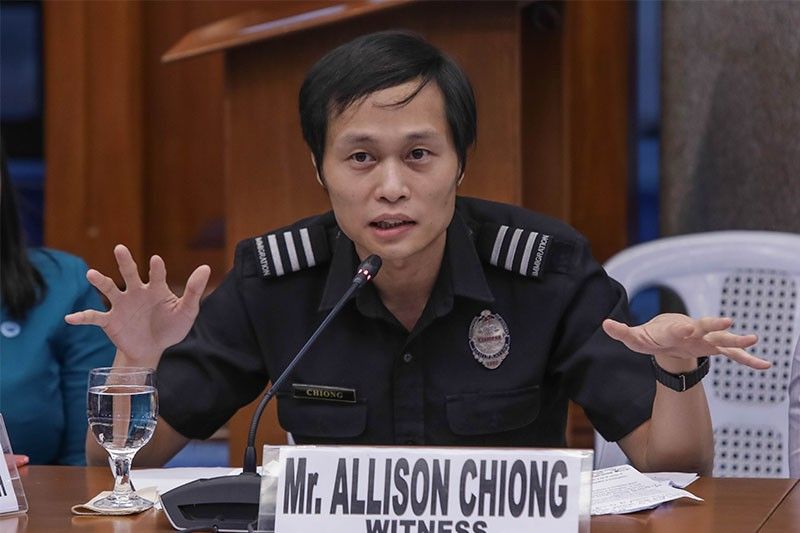Immigration personnel call for better pay, removal of 'adverse conditions' amid 'pastillas' bribery probe

MANILA, Philippines — An association of Bureau of Immiggration personnel said Saturday night that it welcomes government investigations into the alleged "pastillas" bribery scheme at the bureau while also calling for better work conditions, including higher pay, for Immigration employees.
The Immigration Officers Association of the Philippines also said that it is willing to extend the necessary assistance, both "moral and legal," to its members named during the Senate hearing. That assistance is also available to Allison Chiong, who has testified at an ongoing Senate investigation, and who has been entered into the Witness Protection Program.
IOAP said "impartial investigations will ferret out the truth on the issue and save from harassment and destruction of reputation the great majority of Immigration Officers who are innocent and not involved."
The association also called on "the government to eliminate all adverse conditions in the BI which are conducive to corrupt practices" as well as the enactment of "a law modernizing immigration policies and operations, as well as increasing salary scales and compensation of IOs and re-instituting their overtime benefits, among others."
Chiong told senators earlier in the week that the bribery scheme started when the overtime pay for BI personnel was cut.
Overtime for bureau personnel was cut in 2017 after the use of Express Lane Fund to pay for overtime was vetoed. The lack of overtime pay, as well as what the Palace acknowledged in 2018 as low basic pay for bureau personnel, led to shorter work hours and of Immigration personnel not reporting for work.
"The basic monthly pay of BI (Bureau of Immigration) employees has remained extremely low in spite of the nature of their work thereby leading to a large number of resignations and causing prejudice to the efficient delivery of frontline services," a Palace memorandum in 2018 to augment pay at the Bureau of Immigration reads.
"There is a need for an interim measure to augment the salaries of BI employees, in recognition of the indispensability of their functions, the apparent disparity between the basic pay of BI employees and employees of agencies performing comparable functions and to promote the continuous and unhampered delivery of basic government services."
The 17th Congress failed to pass pending legislation to reorganize the Bureau of Immigration, which was created in 1940.
RELATED: With OT pay back, Immigration returns to regular work hours
"Currently, an Immigration Officer I is on salary grade 11—the same level as public school teachers, which translates to a take home pay of P15,000. We experience the same difficulties, and add that to the fact that our jobs involve a lot of risks," Immigration Commissioner Jaime Morente said in April 2019.
Bills to modernize the Bureau of Immigration have been filed at the 18th Congress. At the Senate, Sen. Juan Miguel Zubiri filed a bill in July 2019 that would allow the Immigration commissioner to submit "a new staffing pattern and salary schedule for approval, which shall be in accordance with the Salary Standardization Law and other applicable laws under the National Compensation and Classification Plan."
It also authorizes the commissioner to assign personnel to do overtime work "when the work or service to be rendered is to be paid by the airline, shipping companies or other persons served."
The House of Representatives has 11 pending bills dealing with modernizing the Bureau of Immigration.
The bills in both chambers remain at the committee level.
Morente over the weekend called on bureau personnel to "to remain professional and focused on performing our duties and responsibilities in protecting our borders and securing our gateways from the entry of any and all threats" amid the newest scandal to rock BI.
'Pastillas' scheme'
Sen. Risa Hontiveros in a recent Senate probe disclosed that Immigration personnel at airports would pocket bribes from Chinese nationals wanting easier entry onto Philippine soil.
At the hearing, it was whistleblower and immigration officer Allison Chiong, a member of the association himself, who revealed that immigration officers were providing "VIP service" to Chinese travelers for a fee. Immigration officials also present at the hearing denied knowing about the scheme.
Justice Secretary Menardo Guevarra on Friday disclosed that upon the request of Hontiveros and Senate President Vicente Sotto III, Chiong had already been placed under witness protection due to security concerns.
President Rodrigo Duterte has said he “loves” Immigration chief Morente, although the Palace has clarified that Morente is not yet "off the hook" over the scandal.
This, as officials at the Ninoy Aquino International Airport were reportedly removed from their posts by the bureau.
Just last month, the NBI was directed by Guevarra to investigate other immigration personnel allegedly embroiled in human trafficking activities and “facilitating the departure of Filipino tourists intending to work abroad especially in Kuwait and entry of foreign nationals to the Philippines, at the Clark International Airport, Puerto Princesa Airport and Kalibo International Airport.”
'POGOs a foreign-catering industry'
Last year, the Bureau of Immigration was also suspected of escorting Chinese nationals who only had tourist visas but who would end up working in the burgeoning Philippine offshore gaming operators (POGOs) industry.
Just recently, think tank Ibon Foundation in January bared a number of misgivings with POGOs in the country and called for the Duterte administration to instead pursue a genuinely independent foreign policy.
"It is turning out to be another service-oriented – and even foreign-catering – industry that brings temporary and minimal benefits to the country," the research group said in a report.
Even the Department of Justice has tightened down on POGOs by shortening the validity of visas-upon-arrival (VUAs) offered to Chinese tourists.
Justice Undersecretary Markk Perete told reporters in early January that after an amendment to the original rule, VUAs would now be valid for only 30 days and would no longer be extendable, even acknowledging that this move was due in part to the many complaints surrounding POGOs and their workers.
VUA for Chinese nationals has since been suspended due to the threat posed by the Coronavirus Disease. (COVID-19)
- Latest
- Trending



































